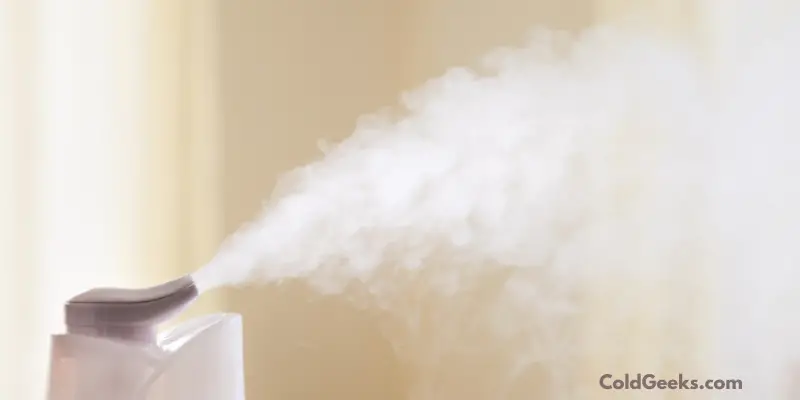As the weather gets colder, lots of people start to use humidifiers.
Is a humidifier good for cold weather?
A humidifier is good for cold weather. Humidifiers help reduce snoring, allergies, static electricity, infections, and dry skin. Humidifiers also make the air feel warmer, conserve energy, protect wood, and boost comfort. Use humidifiers safely to avoid excess moisture in the air.
In this article, you’ll learn everything you need to know about why humidifiers are good for cold weather.
9 Reasons a Humidifier Is Good for Cold Weather

There are at least 9 good reasons that humidifiers are good for cold weather.
Some of the reasons improve your health while others save you money and make your home more comfortable.
1) Helps With Dryer Skin
As someone waging a lifetime battle with dry skin, this benefit really speaks to me.
Winter can be tough on your skin. The air is dry, and the cold weather outside and the heat inside can sap your skin of moisture, leaving it feeling dry, tight, and flaky.
Humidifiers can help with all of these problems by adding moisture to the air.
And when the air is more humid, your skin retains more moisture as well. This can prevent dry skin and even partially slow down the aging process.
In addition, humidifiers can help with other winter ailments such as chapped lips.
2) Lowers Infection Risk
Humidifiers can lower infection risk by increasing the level of humidity in the air.
When the air is too dry, it can cause the mucous membranes in the nose and throat to become irritated and cracked, making it easier for bacteria and viruses to enter the body.
In contrast, when the air is properly humidified, mucous membranes are kept moist and healthy, making it more difficult for pathogens to take hold.
In addition, humidifiers can also help to thin mucus and make it easier to expel from the body.
3) Makes You Feel Warmer
Any time you turn on a humidifier in your house, you might notice that the air suddenly feels warmer.
This phenomenon is caused by the way that water vapor dissolves in the air. When water vapor is present in the air, it reduces the ability of the air to transfer heat.
This means that humid air will feel warmer than dry air, even if the two share the same temperature.
In addition, sweating is one of the body’s ways of cooling off, and when the air is already saturated with water vapor, sweat doesn’t evaporate as quickly.
As a result, people often perceive humid air as being hotter.
However, it’s important to remember that humidifiers only make the air feel warmer. They don’t actually increase the temperature of the air.
4) Reduces Snoring
When the air is dry, it can cause the tissues in your nose and throat to become irritated and swollen.
This can lead to a condition known as nasal congestion, which can make it difficult to breathe and cause you to snore.
A humidifier adds moisture to the air, helping to prevent nasal congestion and other conditions that can contribute to snoring. In addition, a humidifier can also help to reduce snoring by keeping the air in your throat moist.
This helps to lubricate the tissues in your throat, making it less likely that they will vibrate and produce noise.
As a result, using a humidifier at night can be an effective way to reduce or eliminate snoring.
5) Reduces Static Electricity
When the air in your home is too dry, it can cause static electricity and static cling.
This can be annoying and even dangerous, as static shocks can damage delicate electronics. A humidifier adds moisture to the air, reducing static electricity and static cling.
How does this work?
When the air is too dry, it becomes a better conductor of electricity. This means that electrons can move more freely through the air, causing a build-up of static charge.
When you touch something that is electrically charged, you complete the circuit and discharge the static electricity, causing a shock.
A humidifier increases the amount of water vapor in the air, making it more difficult for electrons to move around.
This reduces the build-up of static charge and prevents static shocks.
6) Relieves Asthma
Dry air can exacerbate allergies.
It does this by making the mucous membranes in the nose more susceptible to irritants.
By adding moisture to the air, a humidifier can help to keep the mucous membranes lubricated.
It can also reduce inflammation.
In addition, a humidifier can also help to reduce the amount of dust and other allergens flying freely in the air.
The moisture in the air makes it harder for these particles to become airborne.
Consequently, it can trigger an allergic reaction.
7) Protects Wood
Wood surfaces are susceptible to damage from changes in humidity.
When the air is too dry, wood can crack, warp, and become brittle. This is why I always recommend that homeowners use humidifiers to protect their wood floors and furniture.
By adding moisture to the air, humidifiers help to prevent the wood from drying out and cracking.
This can mean hundreds or even thousands of dollars of savings in repair costs.
8) Conserve Energy
By maintaining a healthy level of relative humidity in your home, you can actually reduce the amount of energy needed to heat or cool the space.
Here’s how it works: when the air is too dry, your body’s natural response is to seek out moisture, which leads to increased sweating.
As your body sweat, it cools off, causing you to feel chilly.
In order to compensate, you turn up the heat, which uses more energy and raises your energy bill.
9) Boosts Comfort
In the winter, the air is so cold and dry that it almost hurts to take a deep breath. Your skin cracks and bleeds.
But in a room with a humidifier, the air is neither too hot nor too cold.
It’s just right.
Personally, I use a humidifier in my bedroom to help me sleep at night.
There’s something about a humidifier that makes me feel more comfortable and relaxed.
Benefits of Humidifiers in Cold Weather
As a summary, here are the major benefits of humidifiers in cold weather:
- Save money
- Feel warmer in winter
- Less snoring
- Easier to breathe
- Prevent sickness
- Relieve allergies
- Protect your wood floors
- Protect your wood furniture
- Prevents annoying static electricity
- Prevents dry, chapped, and flaky skin
Is a Humidifier Always Good for Cold Weather?
A humidifier can come in handy during cold weather months.
However, it is important to use a humidifier properly in order to avoid creating problems such as mold growth or excess condensation.
If you’ve ever had mold in your home, you know how difficult it can be to get rid of (I’m groaning just thinking about it).
Not only is it unsightly, but it can also cause serious health problems for you and your family.
If that’s not enough, mold can damage your home’s structure.
That’s why you should always keep the humidifier clean and empty it out after each use.
Avoid placing the humidifier too close to walls or furniture, as this can cause damage. By following these simple tips, you can enjoy the benefits of a humidifier without inadvertently creating problems.
Here is a good video that reveals the hidden danger of improperly using humidifiers:
Best Humidifiers for Cold Weather
My friends, family, and customers regularly ask me, “What’s the best humidifier for winter?”
To choose the right one, you’ll need to consider:
- The size of the room
- Coverage
- The type of humidifier
- The output
- The runtime
- Noise level
- Ease of use
First, decide what type of humidifier you need.
Humidifiers come in three major versions: warm mist, cool mist, and ultrasonic. Warm mist humidifiers vaporize water with a heated element to vaporize water, which can be beneficial if you have respiratory problems. Cool mist humidifiers use a fan to circulate water vapor, which is ideal for hot, dry climates.
Ultrasonic humidifiers create mist with high-frequency vibrations—perfect for small spaces.
Next, consider the size of the unit. Humidifiers come in all different shapes and sizes, so it’s important to choose one that will be able to cover the area you need it to.
Here are my favorite humidifiers:
| Best Humidifier Categories | Best Humidifier |
|---|---|
| Best Humidifier for Bedrooms | GENIANI Ultrasonic |
| Best Humidifier for Larger Rooms | LEVOIT Humidifier |
| Best Humidifier for Smaller Rooms | Smartmi Humidifier |
| Best Humidifier for Traveling | Crane Mini Portable Humidifier |
| Best Humidifier for Baby | GENIANI Ultrasonic |
| Best Humidifier for Allergies | Afloia Air Purifier & Humidifier |
| Best Humidifier for Plants | LEVOIT Humidifier |
Final Thoughts: Is a Humidifier Good for Cold Weather?
The bottom line is that humidifiers are good for cold weather.
I’ve used one for years and highly recommend that you give one a try in the winter months.
Related posts:
- Is PEX Good for Cold Weather? (Solved & Explained)
- Is Dri Fit Good for Cold Weather? (Tested & Solved)
- Grease and Cold Weather: 11 Answers You Need To Know
- Best Glue for Cold Weather (Tested & Solved)
- Why Does Gum Make Water Cold? (Solved & Explained)
